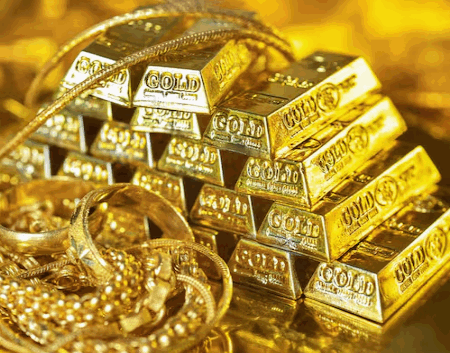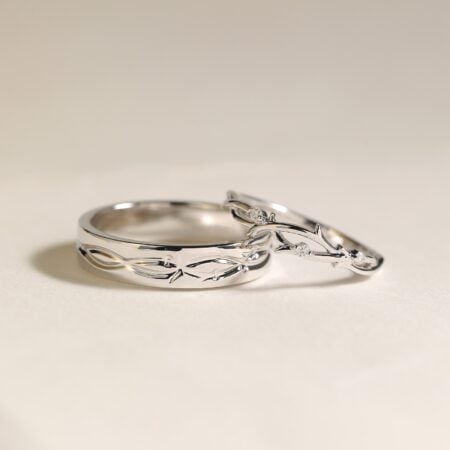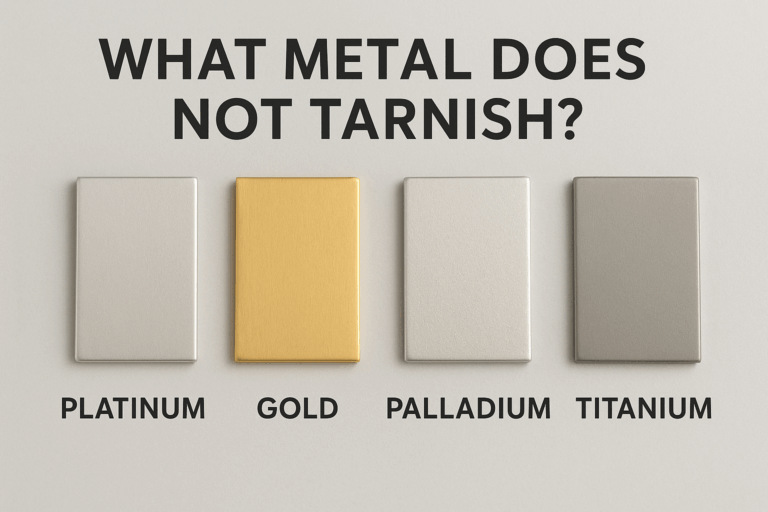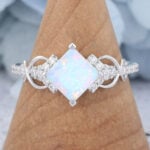What Metal Does Not Tarnish? Discover the Most Durable Jewelry Metals
When it comes to choosing jewelry material that lasts, many people wonder, what metal does not tarnish? By focusing on jewelry metals that don’t tarnish you can enjoy jewelry that resists dullness and requires less upkeep. Knowing which metals maintain their shine helps you make smarter, long-lasting choices when investing in jewelry. Read this guide to explore the best options.
What does Tarnish Mean?
Tarnish refers to a thin, dark or cloudy layer that forms on the surface of metals. Unlike rust, tarnish usually affects only the outer surface and does not damage the internal structure or strength of the metal. With regular cleaning, the shine can be restored, which is why many people prefer investing in jewelry that doesn’t tarnish to keep their pieces looking brilliant for longer.
Why Does Jewelry Tarnish?
The main reason jewelry tarnishes is due to chemical reactions between metals and environmental factors. Airborne oxygen, moisture, sulfur dioxide, as well as everyday elements like sweat, cosmetics, and perfumes, can accelerate jewelry oxidation, forming a dark or cloudy layer on the surface.While this typically affects only the surface and not the inner structure, it does diminish the shine and beauty of the piece. Choosing the best tarnish free jewelry helps reduce maintenance and ensures your accessories stay radiant for longer.
What Gold doesn't Tarnish?
Gold jewelry comes in different purities and alloy mixes, each responding differently to air, moisture, and everyday wear. Learning what gold jewelry doesn’t tarnish involves understanding these variations and how the metal composition affects its long-term appearance.
Does Pure Gold Tarnish?
Pure gold, usually referred to as 24K gold, contains almost no other metals, making it highly stable chemically and resistant to reactions with oxygen, sulfur compounds, or moisture in the air. This means that pure gold rarely tarnishes, allowing jewelry to maintain its natural shine and bright appearance for a long time. It is also highly corrosion-resistant and generally not affected by sweat, perfumes, or everyday chemicals. However, because 24K gold is soft, it can scratch or bend easily, so care is still needed when wearing it.
Does Rose Gold, White Gold and Yellow Gold Tarnish?
Rose gold, white gold, and yellow gold are all alloys, meaning they combine pure gold with other metals to improve durability and hardness.
Yellow gold generally contains silver or copper; higher-karat yellow gold tarnishes very little, while lower-karat versions may darken slightly over time.
White gold is usually mixed with nickel, palladium, or other metals and often plated with rhodium to achieve a bright white finish; the plating can wear off, which may expose the underlying alloy and cause slight discoloration.
Rose gold, made by mixing gold with copper, tends to be more resistant to tarnish, but the copper content can cause a gentle darkening if exposed to harsh chemicals over time.
Also Read: Does White Gold Tarnish How To Restore It
Does 10k Gold Tarnish?
10K gold is an alloy containing approximately 41.7% pure gold, with the remaining portion usually made up of silver, copper, or zinc. Because of its lower gold content, 10K gold is more prone than higher-purity options like 18K gold to react with oxygen, moisture, or other chemicals in the air, which can cause slight discoloration or surface dullness—commonly known as tarnish. However, 10K gold is harder and more wear-resistant, making it very durable for everyday use. With regular cleaning and care, its shine can be effectively maintained, keeping jewelry looking bright and polished.
Will 14k Gold Tarnish?
14K gold is an alloy containing approximately 58.3% pure gold, with the remainder usually made up of silver, copper, or zinc. Compared to 10K gold, 14K gold has a higher gold content, making it more stable and less likely to react with oxygen, moisture, or other chemicals in the air, so it generally does not tarnish easily. However, because it still contains other metals, prolonged exposure to chemicals, sweat, or perfumes may cause slight darkening or discoloration over time, which can usually be removed with proper cleaning. Overall, 14K gold combines durability with a brilliant shine, making it an ideal choice for everyday wear.
Also Read: Is 14K Gold Jewelry Worth Buying
Does 18k Gold Tarnish?
18K gold is made up of about 75% pure gold, with the rest typically consisting of silver, copper, or platinum to improve strength and durability. Its high gold content gives it excellent resistance to tarnish, as it rarely reacts with air, moisture, or everyday chemicals. That said, the small amount of other metals in the alloy can sometimes lead to minor darkening if exposed to sweat, perfumes, or cosmetics over time. Thanks to its balance of purity and resilience, 18K gold remains a popular choice for jewelry that combines lasting beauty with everyday practicality.

What Silver doesn't Tarnish?
Not all silver behaves the same when exposed to air and moisture. Some types are more resistant to oxidation, while others can darken over time. Choosing the right silver that doesn’t tarnish makes a noticeable difference in how often your jewelry needs cleaning and how long it keeps its shine.
Does Sterling Silver Tarnish?
Sterling Silver is also commonly referred to as S925 silver, with the “925” indicating approximately 92.5% silver content, while the remainder is typically composed of copper or other metals to improve hardness and durability. Due to the presence of these reactive metals, Sterling Silver can react with sulfur compounds or moisture in the air, forming a dark or blackish layer on the surface, which is known as tarnish.
Does Fine Silver Tarnish?
Fine Silver (with a purity of approximately 99.9% pure silver) is a type of silver product with an extremely high silver content, containing almost no other metals. Due to its high purity, Fine Silver rarely undergoes chemical reactions in the air, so it generally does not show obvious tarnishing. However, in extreme conditions, such as prolonged contact with sulfides or chemicals, it may experience slight surface discoloration.
Does Silver-plated Tarnish?
Silver-plated jewelry consists of a thin layer of silver applied over a base metal, such as copper, brass, or nickel. Because the silver coating is very thin, it is more susceptible to tarnish than solid silver. Exposure to air, moisture, sweat, or chemicals can quickly cause the silver layer to darken or wear off, revealing the base metal underneath. While silver-plated pieces can offer an affordable alternative to solid silver, they require careful maintenance and gentle cleaning to prolong their shine.

Does Platinum tarnish?
Platinum is a naturally pure and chemically stable precious metal that rarely reacts with air, moisture, or everyday chemicals, making it generally resistant to tarnish. Unlike gold or silver, platinum does not form an oxide layer or dark film, allowing its brilliant shine to last over time. Its high hardness and density make it resistant to scratches and deformation, making it ideal for everyday wear and collectible jewelry. Platinum is widely regarded as the best metal for jewelry that doesn’t tarnish.
Does Stainless Steel Tarnish?
Stainless Steel is an alloy composed of iron, carbon, and metals such as chromium and nickel. Its surface forms a dense chromium oxide layer, giving it excellent corrosion resistance. Thanks to this protective layer, Stainless Steel rarely tarnishes or rusts during everyday wear and is considered the cheapest metal that doesn’t rust.
Does Titanium Tarnish?
Titanium is a naturally strong and lightweight metal known for its exceptional resistance to corrosion and oxidation. Unlike silver or lower-karat gold, titanium does not react easily with air, moisture, or chemicals, so it virtually never tarnishes. Its durability, scratch resistance, and ability to retain color make it an excellent choice for everyday jewelry, including rings, bracelets, and necklaces. Titanium also requires minimal maintenance, making it ideal for those seeking long-lasting, low-care pieces.
Does Palladium Tarnish?
Palladium is a rare and naturally white precious metal that belongs to the platinum family. It is highly resistant to corrosion, oxidation, and tarnish due to its stable chemical properties. Unlike silver, which can darken over time, or lower-karat gold alloys that may react with moisture or chemicals, palladium maintains its bright, silvery-white shine even with regular wear. Its durability, lightweight feel, and low-maintenance nature make it an excellent choice for rings, earrings, and other fine jewelry pieces.
Does Nickel Tarnish?
Nickel is a base metal commonly used in jewelry alloys and plating. Unlike precious metals such as gold, platinum, or palladium, nickel is more reactive and prone to oxidation. Over time, exposure to air, moisture, sweat, and chemicals can cause nickel-containing jewelry to develop discoloration or a darkened surface, which is considered a form of tarnish. In addition, nickel can sometimes trigger allergic reactions in sensitive skin, making it less ideal for long-term wear.
Does Copper Alloy Tarnish?
Copper alloys, commonly used in jewelry, consist of copper mixed with other metals such as zinc, tin, or nickel to improve strength and durability. Due to the high copper content, these alloys are prone to tarnish over time. Exposure to air, moisture, sweat, and chemicals can cause the surface to darken or develop a greenish patina, which is a natural form of oxidation.
What Metal Does Not Tarnish?
From the explanation above, it is clear that certain metals are highly resistant to oxidation and maintain their appearance over time. Among these, platinum, pure gold, stainless steel, titanium, and palladium stand out for their durability and low maintenance.
Platinum is highly resistant to corrosion and oxidation, making it a long-lasting choice. Gold in its pure form does not tarnish, though alloys with lower gold content may require some care. Stainless steel offers excellent corrosion resistance at an affordable price, making it a practical everyday option. Titanium is lightweight and highly resistant to oxidation, while palladium, a naturally white precious metal, maintains its shine with minimal maintenance. Each of these metals provides unique advantages for creating jewelry that keeps its brilliance over time.

How to Clean Tarnished Jewelry?
Understanding Jewelry Materials
Before cleaning, it is important to identify the metal of your jewelry. Different metals have different tolerances, and using the wrong cleaning method can damage the surface. For example:
- Sterling Silver tends to oxidize and darken, requiring regular cleaning.
- Gold generally resists oxidation, but alloys containing other metals may develop slight discoloration.
- Copper and Copper Alloys are prone to developing green oxidation (patina).
- Nickel can tarnish over time and may require occasional cleaning to maintain its shine.
- Titanium, Stainless Steel, Platinum, and Palladium are generally resistant to oxidation, but dirt or grime can cause them to lose their luster.
Everyday Cleaning Methods
- Warm Water and Soap: Soak the jewelry in warm water with a small amount of mild detergent for a few minutes, gently brush the surface with a soft brush, rinse with clean water, and then dry with a soft cloth. Suitable for most metals, including Sterling Silver, Gold, Copper, Nickel, Titanium, Stainless Steel, Platinum, and Palladium, as well as gemstone settings.
- Toothpaste Cleaning: For Sterling Silver, Copper, or Nickel jewelry, apply a small amount of non-abrasive toothpaste to a soft cloth and gently rub, then rinse with clean water. Avoid abrasive toothpaste to prevent scratching.
- Specialized Jewelry Cleaner: Commercial jewelry cleaning solutions can be used according to instructions. They typically remove tarnish quickly and are suitable for metals like Sterling Silver, Gold, Copper alloys, and Nickel.
Also Read: How To Clean Gold Jewelry Properly Avoid These Common Mistakes
Caring for Jewelry Metals
Proper care is essential to keep your jewelry looking its best. Store pieces in a dry, cool place and avoid exposure to chemicals, sweat, or water, which can cause tarnish on metals like Sterling Silver, Copper, or Nickel. Regularly wipe your jewelry with a soft cloth to remove oils and dirt. For minimal maintenance, consider investing in tarnish proof jewelry such as Titanium, Stainless Steel, Palladium, or Platinum, which naturally resist oxidation and retain their shine longer.
Conclusion
Knowing What Metal Does Not Tarnish is essential for choosing long-lasting jewelry. Metals like Platinum, Palladium, Titanium, Stainless Steel, and high-karat Gold—such as 18K or 24K Gold—resist oxidation and require minimal maintenance. In contrast, Sterling Silver, Copper, and Nickel need more regular care. Selecting the right metal and following proper care ensures your jewelry stays brilliant and durable for years.
FAQs About What Metal Does Not Tarnish
What metal does not tarnish?
Metals like Platinum, Palladium, Titanium, Stainless Steel, and high-karat Gold (18K–24K) are highly resistant to tarnishing.
Does white gold tarnish over time?
White gold may slightly discolor over time due to the other metals in the alloy, but proper cleaning can restore its shine.
Why does gold tarnish?
Gold itself does not tarnish, but lower-karat gold containing other metals like copper or silver can darken when exposed to air, moisture, or chemicals.
Which gold karat is most resistant to tarnish?
24K and 18K gold are the most resistant to tarnish due to their higher pure gold content.
Why does silver tarnish?
Silver tarnishes when it reacts with sulfur or oxygen in the air, forming a dark layer on the surface.
What silver does not turn green?
Sterling silver and pure silver do not turn green, though alloys with copper may cause greenish discoloration on the skin.
Will sterling silver tarnish?
Yes, sterling silver can tarnish over time, especially if exposed to air, moisture, or chemicals.
How to prevent sterling silver from tarnishing?
Store in a dry, airtight container, avoid exposure to chemicals, and clean regularly with a soft cloth.
Is stainless steel jewelry completely maintenance-free?
Not entirely; stainless steel is highly resistant to tarnish and rust but should be cleaned occasionally to remove dirt and oils.
Will alloy metal tarnish?
Yes, metals mixed with other metals can tarnish depending on their composition and exposure to air, moisture, or chemicals.
What metal doesn’t rust?
Metals like Platinum, Palladium, Titanium, Stainless Steel, and high-karat Gold do not rust.



